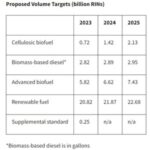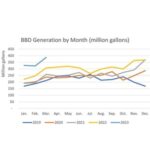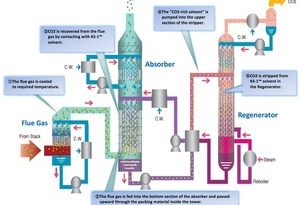Biofuel groups urge the EPA to get the RFS back on track
Energy Disrupter
ADVERTISEMENT
Representatives of the U.S. biofuels industry slammed the U.S. EPA’s delays in setting Renewable Fuel Standard volume requirements and called on the agency to get the RFS back on track during a Dec. 3 hearing.
The EPA hosted the hearing to gather public comments on a proposed rule issued Nov. 18 that aims to further delay certain RFS compliance deadlines for compliance years 2019, 2020 and 2021, and change how the agency sets RFS compliance and attest engagement deadlines moving forward. A public comment period on the proposed rule is open through Jan. 3.
The EPA in March 2021 published a final rule extending the RFS compliance and attest engagement report deadlines for 2020. The attest engagement report deadline for 2021 was also extended, along with the 2019 compliance and attest engagement report deadlines for small refiners. The proposed rule issued on Nov. 18 aims to enact further deadline delays and change the way EPA sets RFS compliance and attest engagement reporting deadlines moving forward.
In its previous rulemaking, the EPA extended the 2019 compliance deadline for small refineries from March 31, 2020 to Nov. 30, 2021. The agency’s new proposal aims to set the 2019 compliance deadline for small refineries at the next quarterly reporting deadline that is at least 60 days following publication of the 2021 RVOs in the Federal Register.
In the proposed rule, the agency explains the delay in the 2019 compliance deadline for small refiners is needed because the agency is still considering how to adjust its small refinery exemption (SRE) policy in light of the Tenth Circuit Court of Appeals’ January 2020 decision and the U.S. Supreme Court’s subsequent ruling on SREs handed down in June 2021, including holdings from the Tenth Circuit case that were not appealed. As a result, the agency said there is still uncertainty regarding 2019 SRE petitions. The EPA is proposing to extend the deadline for all small refineries regardless of whether they have an SRE petition pending for 2019 because those that do not may elect to submit petitions in the future. Under the proposal, small refineries that have already submitted their 2019 compliance reports would be allowed to revisit those compliance reports before the new deadline.
The previous rulemaking also extended the 2020 compliance deadline for all obligated parties from March 31, 2021 to Jan. 31, 2022. EPA is now proposing to extend the RFS compliance deadline for the 2020 and 2021 compliance years for all obligated parties. The proposed 2020 compliance deadline is the next quarterly reporting deadline after the 2019 compliance deadline for small refineries and the proposed 2021 compliance deadline is the next quarterly reporting deadline after the 2020 compliance deadline.
For 2019, 2020, and 2021, the EPA is proposing to extend the associated attest engagement reporting deadlines to the next June 1 annual attest engagement reporting deadline that is at least 60 days after the applicable 2019, 2020 and 2021 compliance deadline.
The agency is also proposing to change the way in which future RFS compliance and attest engagement reporting deadlines are determined. Starting with compliance year 2022, the annual compliance reporting deadline would be the latest date of three options, including March 31 of the subsequent calendar year, the next quarterly reporting that is at least 60 days after publication in the Federal Register of a final rule establishing the subsequent compliance year’s RVOs, or the next quarterly reporting deadline under 40 CFR 80.1451(f)(2) after the annual compliance reporting deadline for the prior compliance year. Similarly, the annual attest engagement reporting deadline would be set at the latest of two options, including June 1 of the subsequent calendar year or the next June 1 annual attest engagement reporting deadline that is at least 60 days after the annual compliance reporting deadline.
The EPA said the proposed extensions aim to ensure obligated parties are positioned to fully comply with their RFS obligations by ensuring that each’s year’s compliance deadline falls after the standards for the subsequent compliance year are known. The proposed approach for compliance year 2022 and thereafter would also avoid EPA having to repeatedly extend compliance deadlines for obligated parties should promulgation of the subsequent year’s standards be delayed, according to the agency.
The Renewable Fuels Association urged the EPA to move forward on enforcing the RFS and reject any proposals to again delay annual RFS compliance deadlines. “EPA has had ample time to decide pending 2019 and 2020 SRE petitions following the Supreme Court’s June 2021 decision in the HollyFrontier v. RFA case, which left intact two important holdings from the Tenth Circuit Court’s January 2020 decision in the RFA v. EPA case,” said Geoff Cooper, president and CEO of the RFA, in prepared testimony. “We strongly encourage EPA to immediately decide the remaining 2019 and 2020 SRE petitions in a manner consistent with the unappealed holdings of the Tenth Circuit decision. And immediately upon deciding those petitions, EPA should require compliance with the final 2019 and 2020 standards.”
RFA also urged EPA to resist pressure from the refining industry to retroactively reopen and revise the 2020 standards to account for the impact of COVID on fuel markets. Cooper pointed out that the RFS already includes flexibility and a self-adjusting mechanism to account for marketplace anomalies like COVID. “EPA’s RVO is a percentage-based standard that already accommodates fluctuations in the actual consumption of gasoline and diesel fuel,” he said. “No further adjustment to the 2020 RVO is necessary or legally permissible.”
Cooper urged the EPA to take three specific steps to ensure stability in the fuel marketplace. First, he urged the agency to immediately issue decisions on pending 2019 and 2020 SRE petitions, ensuring that those decisions comply with the requirements of the Tenth Circuit Court decision. Second, he said the EPA should, upon deciding those SRE petitions, immediately require compliance with 2019 and 2020 standards. Finally, he called on the EPA to immediately issue the long-overdue proposals for 2021 and 2022 RVOs.
“RFA fully understands that the previous administration left the RFS program in disarray and failed to meet its deadlines for deciding SRE petitions and issuing RVOs,” Cooper said. “Mismanagement of the RFS program under the previous administration created significant turmoil and uncertainty in the marketplace and undermined the purpose and intent of the RFS. Extending the compliance deadlines again would only exacerbate the uncertainty and instability created by the past administration.”
Growth Energy called on the EPA to take immediate steps to restore integrity to the RFS. “The intent of the RFS is to blend more biofuels into our nation’s transportation fuel supply. Period,” said Chris Bliley, senior vice present of Growth Energy. “It is not meant to reward oil companies for suing to prevent higher blends and then demand that the agency further delay compliance.
“With recent research showing that greenhouse gas emissions from corn ethanol are 46 percent lower than gasoline, it makes no sense why EPA would continue to allow further delays for oil companies to demonstrate compliance with their blending obligations,” he continued.
“Instead, EPA should take immediate steps to restore integrity to the RFS, restore lost biofuel demand, and remove remaining hurdles to E15 and higher biofuel blends,” Bliley added.
The American Coalition for Ethanol also called on the EPA to get the RFS back on track and rule on pending SRE petitions. Ron Lamberty, senior vice president of ACE, pointed out that if EPA would have finalized the 2021 RVO on time last November and predicted gas volumes would return to 2019 levels, the 2021 percentage would have assured refiners their renewable fuel requirements would again fall or rise as petroleum volumes remained flat or grew.
“Instead, the reason EPA has to propose delaying compliance reporting and attest engagements for 2021 and 2022 is EPA’s own failure to establish annual Renewable Volume Obligations when they are supposed to be established,” Lamberty’s testimony reads.
The testimony makes clear that even if EPA’s proposal to extend RFS compliance goes into effect, “it should in no way be viewed as implicit acceptance of EPA’s failure to do its job and establish RVOs by November 30 of each year for the following year.” Lamberty emphasized that failing to meet the statutory deadlines is not acceptable and the proposal “would be unnecessary if EPA had simply followed the law.”
Lamberty’s testimony concluded by encouraging “EPA to rule on pending SREs, issue 2021 and 2022 RVOs and get the program back on track as quickly as possible to provide the certainty needed by refiners and ethanol producers alike.”
The National Biodiesel Board urged the EPA to withdraw the proposed rule, maintain the annual compliance deadlines, and immediately issue the 2021 and 2022 RVOs. “EPA is attempting to sneak in an automatic delay in the compliance reporting and attest engagements for future years,” said Kate Shenk, director of regulatory affairs at the NBB. “However, what we see is an admission that EPA will miss the statutory deadlines going forward, while making it easier to do so. With EPA’s current non-actions on issuing the RVO, coupled with this proposal, EPA is acting as if there is no statutory deadline for promulgating annual rules.”
















